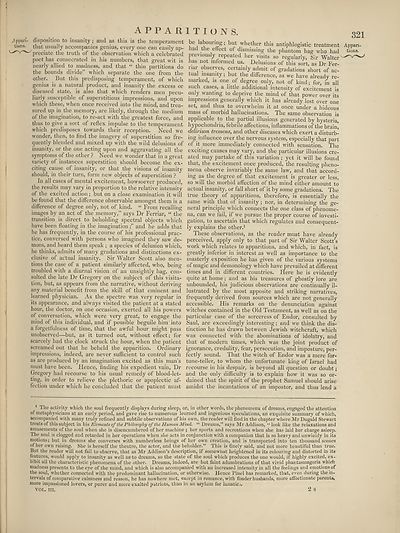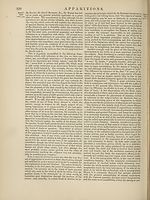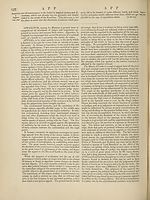Encyclopaedia Britannica > Volume 3, Anatomy-Astronomy
(329) Page 321
Download files
Complete book:
Individual page:
Thumbnail gallery: Grid view | List view

A P P A R
Appari- disposition to insanity; and as this is the temperament
linns, that usually accompanies genius, every one can easily ap-
preciate the truth of the observation which a celebrated
poet has consecrated in his numbers, that great wit is
nearly allied to madness, and that “ thin partitions do
the bounds divide” which separate the one from the
other. But this predisposing temperament, of which
genius is a natural product, and insanity the excess or
diseased state, is also that which renders men pecu¬
liarly susceptible of superstitious impressions, and upon
which these, when once received into the mind, and trea¬
sured up in the memory, are likely, through the medium
of the imagination, to re-act with the greatest force, and
thus to give a sort of reflex impulse to the temperament
which predisposes towards their reception. Need we
wonder, then, to find the imagery of superstition so fre¬
quently blended and mixed up with the wild delusions of
insanity, or the one acting upon and aggravating all the
symptoms of the other ? Need we wonder that in a great
variety of instances superstition should become the ex¬
citing cause of insanity, or that the visions of insanity
should, in their turn, form new objects of superstition ?
In all cases of mental excitement, howsoever produced,
the results may vary in proportion to the relative intensity
of the excited action; but on a close examination it will
be found that the difference observable amongst them is a
difference of degree only, not of kind. “ From recalling
images by an act of the memory,” says Dr Ferriar, “ the
transition is direct to beholding spectral objects which
have been floating in the imaginationand he adds that
he has frequently, in the course of his professional prac¬
tice, conversed with persons who imagined they saw de¬
mons, and heard them speak ; a species of delusion which,
he thinks, admits of many gradations and distinctions ex¬
clusive of actual insanity. Sir Walter Scott also men¬
tions the case of a patient similarly affected, who, being
troubled with a diurnal vision of an unsightly hag, con¬
sulted the late Dr Gregory on the subject of this visita¬
tion, but, as appears from the narrative, without deriving
any material benefit from the skill of that eminent and
learned physician. As the spectre was very regular in
its appearance, and always visited the patient at a stated
hour, the doctor, on one occasion, exerted all his powers
of conversation, which were very great, to engage the
mind of this individual, and if possible beguile him'into
a forgetfulness of time, that the awful hour might pass
unobserved—but, as it turned out, without effect; for
scarcely had the clock struck the hour, when the patient
screamed out that he beheld the apparition. Ordinary
impressions, indeed, are never sufficient to control such
as are produced by an imagination excited as this man’s
must have been. Hence, finding his expedient vain, Dr
Gregory had recourse to his usual remedy of blood-let¬
ting, in order to relieve the plethoric or apoplectic af¬
fection under which he concluded that the patient must
1 X I O IV S. g2"
be labouring; but whether this antiphlogistic treatment Appan-
nad the effect of dismissing the phantom hag who had fl°ns-
previously repeated her visits so regularly, Sir Walter
has not informed us. Delusions of this sort, as Dr Fer-
i iar observes, certainly admit of gradations short of ac¬
tual insanity; but the difference, as we have already re¬
marked, is one of degree only, not of kind; for, in all
such cases, a little additional intensity of excitement is
only wanting to deprive the mind of that power over its
impressions generally which it has already lost over one
set, and thus to overwhelm it at once under a hideous
mass of moi bid hallucinations. The same observation is
applicable to the partial illusions generated by hysteria,
hypochondria, febrile affections, inflammations of the brain*,
delirium tremens, and other diseases which exert a disturb¬
ing influence over the nervous system, especially that part
of it more immediately connected with sensation. The
exciting causes may vary, and the particular illusions cre¬
ated may partake of this variation ; yet it will be found
that, the excitement once produced, the resulting pheno¬
mena observe invariably the same law, and that accord¬
ing as the degree of that excitement is greater or less,
so will the morbid affection of the mind either amount to
actual insanity, or fall short of it by some gradations. The
true theory of apparitions, therefore, is essentially the
same with that of insanity; nor, in determining the ge¬
neral principle which connects the one class of phenome¬
na, can we fail, if we pursue the proper course of investi¬
gation, to ascertain that which regulates and consequent¬
ly explains the other.1
These observations, as the reader must have already
perceived, apply only to that part of Sir Walter Scott’s
work which relates to apparitions, and which, in fact, is
greatly inferior in interest as well as importance to the
masterly exposition he has given of the various systems
of magic and demonology which have prevailed at different
times and in different countries. Here he is evidently
quite at home; and as his treasures of ghostly lore are
unbounded, his judicious observations are continually il¬
lustrated by the most apposite and striking narratives,
frequently derived from sources which are not generally
accessible. His remarks on the denunciation against
witches contained in the Old Testament, as well as on the
particular case of the sorceress of Endor, consulted by
Saul, are exceedingly interesting; and we think the dis¬
tinction he has drawn between Jewish witchcraft, which
was connected with the abominations of idolatry, and
that of modern times, which was the joint product of
ignorance, credulity, fear, persecution, and imposture, per¬
fectly sound. That the witch of Endor was a mere for¬
tune-teller, to whom the unfortunate king of Israel had
recourse in his despair, is beyond all question or doubt;
and the only difficulty is to explain how it was so or¬
dained that the spirit of the prophet Samuel should arise
amidst the incantations of an impostor, and thus lend a
1 The activity which the soul frequently displays during sleep, or, in other words, the phenomena of dreams, engaged the attention
of metaphysicians at an early period, and gave rise to numerous learned and ingenious speculations, an exquisite summary of which,
accompanied with many truly refined and subtile observations of his own, the reader will find in the chapter where Mr Dugald Stewart
treats of this subject in his Elements of the Philosophy of the Human Mind. “ Breams,” says Mr Addison, “ look like the relaxations and
amusements of the soul when she is disencumbered of her machine ; her sports and recreations when she has laid her charge asleep,
fhe soul is clogged and retarded in her operations when she acts in conjunction with a companion that is so heavy and unwieldy in its
motions; but in dreams she converses with numberless beings of her own creation, and is transported into ten thousand scenes
of her own raising. She is herself the theatre, the actor, and the beholder.” This is finely said, and not more beautiful than true.
But the reader will not fail to observe, that as Mr Addison’s description, if somewhat heightened in its colouring and distorted in its
features, would apply to insanity as well as to dreams, so the state of the soul which produces the one would, if highly excited, ex¬
hibit all the characteristic phenomena of the other. Dreams, indeed, are but faint adumbrations of that vivid phantasmagoria which
madness presents to the eye of the mind, and which is also accompanied with an increased intensity in all the feelings and emotions of
the soul, whether connected with the predominant hallucination, or otherwise. Hence Pinel has remarked, that, even during the in¬
tervals of comparative calmness and reason, he has nowhere met, except in romance, with fonder husbands, more affectionate parents,
more impassioned lovers, or purer and more exalted patriots, than in an asylum for lunatics.
vol. m. 2 s
Appari- disposition to insanity; and as this is the temperament
linns, that usually accompanies genius, every one can easily ap-
preciate the truth of the observation which a celebrated
poet has consecrated in his numbers, that great wit is
nearly allied to madness, and that “ thin partitions do
the bounds divide” which separate the one from the
other. But this predisposing temperament, of which
genius is a natural product, and insanity the excess or
diseased state, is also that which renders men pecu¬
liarly susceptible of superstitious impressions, and upon
which these, when once received into the mind, and trea¬
sured up in the memory, are likely, through the medium
of the imagination, to re-act with the greatest force, and
thus to give a sort of reflex impulse to the temperament
which predisposes towards their reception. Need we
wonder, then, to find the imagery of superstition so fre¬
quently blended and mixed up with the wild delusions of
insanity, or the one acting upon and aggravating all the
symptoms of the other ? Need we wonder that in a great
variety of instances superstition should become the ex¬
citing cause of insanity, or that the visions of insanity
should, in their turn, form new objects of superstition ?
In all cases of mental excitement, howsoever produced,
the results may vary in proportion to the relative intensity
of the excited action; but on a close examination it will
be found that the difference observable amongst them is a
difference of degree only, not of kind. “ From recalling
images by an act of the memory,” says Dr Ferriar, “ the
transition is direct to beholding spectral objects which
have been floating in the imaginationand he adds that
he has frequently, in the course of his professional prac¬
tice, conversed with persons who imagined they saw de¬
mons, and heard them speak ; a species of delusion which,
he thinks, admits of many gradations and distinctions ex¬
clusive of actual insanity. Sir Walter Scott also men¬
tions the case of a patient similarly affected, who, being
troubled with a diurnal vision of an unsightly hag, con¬
sulted the late Dr Gregory on the subject of this visita¬
tion, but, as appears from the narrative, without deriving
any material benefit from the skill of that eminent and
learned physician. As the spectre was very regular in
its appearance, and always visited the patient at a stated
hour, the doctor, on one occasion, exerted all his powers
of conversation, which were very great, to engage the
mind of this individual, and if possible beguile him'into
a forgetfulness of time, that the awful hour might pass
unobserved—but, as it turned out, without effect; for
scarcely had the clock struck the hour, when the patient
screamed out that he beheld the apparition. Ordinary
impressions, indeed, are never sufficient to control such
as are produced by an imagination excited as this man’s
must have been. Hence, finding his expedient vain, Dr
Gregory had recourse to his usual remedy of blood-let¬
ting, in order to relieve the plethoric or apoplectic af¬
fection under which he concluded that the patient must
1 X I O IV S. g2"
be labouring; but whether this antiphlogistic treatment Appan-
nad the effect of dismissing the phantom hag who had fl°ns-
previously repeated her visits so regularly, Sir Walter
has not informed us. Delusions of this sort, as Dr Fer-
i iar observes, certainly admit of gradations short of ac¬
tual insanity; but the difference, as we have already re¬
marked, is one of degree only, not of kind; for, in all
such cases, a little additional intensity of excitement is
only wanting to deprive the mind of that power over its
impressions generally which it has already lost over one
set, and thus to overwhelm it at once under a hideous
mass of moi bid hallucinations. The same observation is
applicable to the partial illusions generated by hysteria,
hypochondria, febrile affections, inflammations of the brain*,
delirium tremens, and other diseases which exert a disturb¬
ing influence over the nervous system, especially that part
of it more immediately connected with sensation. The
exciting causes may vary, and the particular illusions cre¬
ated may partake of this variation ; yet it will be found
that, the excitement once produced, the resulting pheno¬
mena observe invariably the same law, and that accord¬
ing as the degree of that excitement is greater or less,
so will the morbid affection of the mind either amount to
actual insanity, or fall short of it by some gradations. The
true theory of apparitions, therefore, is essentially the
same with that of insanity; nor, in determining the ge¬
neral principle which connects the one class of phenome¬
na, can we fail, if we pursue the proper course of investi¬
gation, to ascertain that which regulates and consequent¬
ly explains the other.1
These observations, as the reader must have already
perceived, apply only to that part of Sir Walter Scott’s
work which relates to apparitions, and which, in fact, is
greatly inferior in interest as well as importance to the
masterly exposition he has given of the various systems
of magic and demonology which have prevailed at different
times and in different countries. Here he is evidently
quite at home; and as his treasures of ghostly lore are
unbounded, his judicious observations are continually il¬
lustrated by the most apposite and striking narratives,
frequently derived from sources which are not generally
accessible. His remarks on the denunciation against
witches contained in the Old Testament, as well as on the
particular case of the sorceress of Endor, consulted by
Saul, are exceedingly interesting; and we think the dis¬
tinction he has drawn between Jewish witchcraft, which
was connected with the abominations of idolatry, and
that of modern times, which was the joint product of
ignorance, credulity, fear, persecution, and imposture, per¬
fectly sound. That the witch of Endor was a mere for¬
tune-teller, to whom the unfortunate king of Israel had
recourse in his despair, is beyond all question or doubt;
and the only difficulty is to explain how it was so or¬
dained that the spirit of the prophet Samuel should arise
amidst the incantations of an impostor, and thus lend a
1 The activity which the soul frequently displays during sleep, or, in other words, the phenomena of dreams, engaged the attention
of metaphysicians at an early period, and gave rise to numerous learned and ingenious speculations, an exquisite summary of which,
accompanied with many truly refined and subtile observations of his own, the reader will find in the chapter where Mr Dugald Stewart
treats of this subject in his Elements of the Philosophy of the Human Mind. “ Breams,” says Mr Addison, “ look like the relaxations and
amusements of the soul when she is disencumbered of her machine ; her sports and recreations when she has laid her charge asleep,
fhe soul is clogged and retarded in her operations when she acts in conjunction with a companion that is so heavy and unwieldy in its
motions; but in dreams she converses with numberless beings of her own creation, and is transported into ten thousand scenes
of her own raising. She is herself the theatre, the actor, and the beholder.” This is finely said, and not more beautiful than true.
But the reader will not fail to observe, that as Mr Addison’s description, if somewhat heightened in its colouring and distorted in its
features, would apply to insanity as well as to dreams, so the state of the soul which produces the one would, if highly excited, ex¬
hibit all the characteristic phenomena of the other. Dreams, indeed, are but faint adumbrations of that vivid phantasmagoria which
madness presents to the eye of the mind, and which is also accompanied with an increased intensity in all the feelings and emotions of
the soul, whether connected with the predominant hallucination, or otherwise. Hence Pinel has remarked, that, even during the in¬
tervals of comparative calmness and reason, he has nowhere met, except in romance, with fonder husbands, more affectionate parents,
more impassioned lovers, or purer and more exalted patriots, than in an asylum for lunatics.
vol. m. 2 s
Set display mode to:
![]() Universal Viewer |
Universal Viewer | ![]() Mirador |
Large image | Transcription
Mirador |
Large image | Transcription
Images and transcriptions on this page, including medium image downloads, may be used under the Creative Commons Attribution 4.0 International Licence unless otherwise stated. ![]()
| Encyclopaedia Britannica > Encyclopaedia Britannica > Volume 3, Anatomy-Astronomy > (329) Page 321 |
|---|
| Permanent URL | https://digital.nls.uk/193761625 |
|---|
| Attribution and copyright: |
|
|---|---|
| Shelfmark | EB.16 |
|---|---|
| Description | Ten editions of 'Encyclopaedia Britannica', issued from 1768-1903, in 231 volumes. Originally issued in 100 weekly parts (3 volumes) between 1768 and 1771 by publishers: Colin Macfarquhar and Andrew Bell (Edinburgh); editor: William Smellie: engraver: Andrew Bell. Expanded editions in the 19th century featured more volumes and contributions from leading experts in their fields. Managed and published in Edinburgh up to the 9th edition (25 volumes, from 1875-1889); the 10th edition (1902-1903) re-issued the 9th edition, with 11 supplementary volumes. |
|---|---|
| Additional NLS resources: |
|

